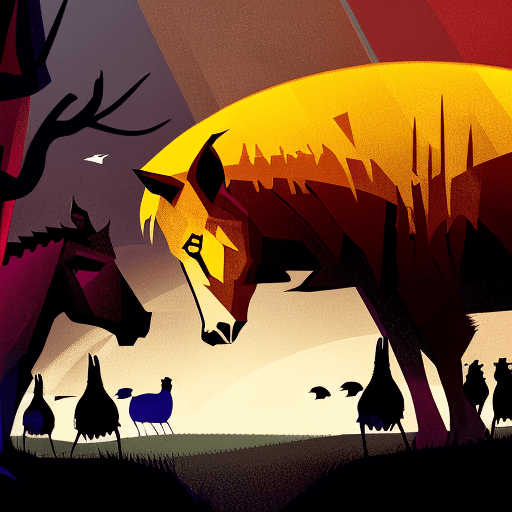One-line Summary:
In George Orwell’s Animal Farm, a group of farm animals overthrow their human farmer in the hopes of creating a utopian society, but power corrupts and leads to a new form of tyranny.
The Rise of Animalism
Animal Farm begins with the animals on Manor Farm, led by the pigs Old Major, Snowball, and Napoleon, rebelling against their human owner, Mr. Jones. Inspired by Old Major’s vision of a world without human exploitation, the animals establish a new system called Animalism. They create a set of commandments, the most important being “All animals are equal.”
The Corruption of Power
As time goes on, the pigs, led by Napoleon, begin to assert their dominance and manipulate the other animals. They take control of the farm’s resources, establish themselves as the ruling class, and rewrite the commandments to suit their own interests. The pigs gradually become more like humans, walking on two legs and engaging in trade with neighboring farms.
The Betrayal of the Revolution
The original principles of Animalism are completely abandoned, and the animals find themselves living under a new form of tyranny. Napoleon and his inner circle exploit the other animals, using fear and propaganda to maintain their power. The animals work harder than ever, yet their living conditions deteriorate, and they are constantly reminded that their sacrifices are for the “greater good.”
Despite the hardships, some animals still hold onto the hope of a better future. Snowball, who was expelled from the farm by Napoleon, represents the idealistic vision of the revolution and continues to fight for the animals’ rights. However, Napoleon’s propaganda machine portrays Snowball as a traitor and a threat to the farm’s stability, further solidifying Napoleon’s grip on power.
Key Takeaways:
- Power corrupts: Animal Farm serves as a cautionary tale about the dangers of unchecked power and the potential for even the most well-intentioned revolutions to be co-opted by those seeking personal gain.
- The importance of critical thinking: The animals’ blind loyalty to the pigs and their inability to question authority allows for the manipulation and exploitation to take place.
- The perversion of ideals: The original principles of Animalism, such as equality and solidarity, are gradually eroded as the pigs prioritize their own interests.
“All animals are equal, but some animals are more equal than others.”
In this famous quote from the book, the pigs reveal their true intentions and highlight the hypocrisy of their rule. It encapsulates the central theme of the novel, exposing the corruption and inequality that arises when power is concentrated in the hands of a few.
Animal Farm serves as a powerful allegory for the rise and betrayal of revolutions throughout history. Orwell’s portrayal of the animals’ struggle against oppression and their eventual subjugation by their own leaders serves as a stark reminder of the dangers of totalitarianism and the importance of remaining vigilant in the face of power.












